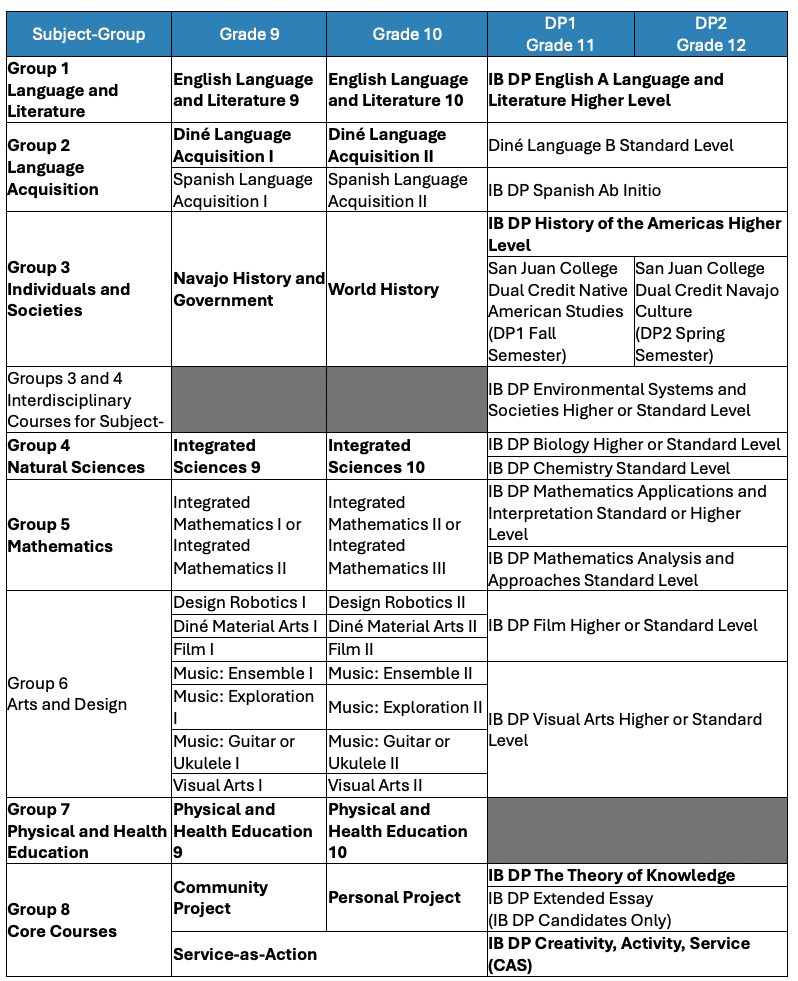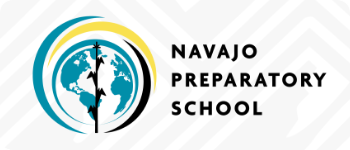Course Sequence and Core Components
The following course sequence shows an outline of the courses offered at Navajo Preparatory School and the progression students can anticipate each year. All students in their Junior and Senior years will be enrolled in two-year IB Diploma Programme (DP) even if they are not pursuing a Full IB Diploma Candidacy. The IB curriculum provides a cohesive and comprehensive liberal arts and sciences program of study for highly motivated students of differing educational backgrounds, abilities, and interests. It is not just a set of examinations, but a rigorous pre-university curriculum, which will provide the basis for life-long learning. In the below table, required subject-groups and courses are BOLDED.

NPS Core Courses
In addition to students’ scheduled classes, each year at Navajo Preparatory School has required core components that focus on service-learning and project-based learning. These core components foster students’ development of their Approaches to Learning (ATL) skills for collaboration, communication, thinking, research, and self-management.
Service-as-Action (Grades 9 & 10)
Service as action leads towards a set of developmentally appropriate learning outcomes from experiential service learning responding to an authentic community need. It helps students develop their personal understanding, their emerging sense of self and their responsibility to their community by engaging them in-depth inquiry that leads to action. Students have an opportunity to practice, continue to develop, and reflect upon their Approaches to Learning (ATL) skills and IB Learner Profile attributes while acting with international mindedness.
Community Project (Grade 9)
The community project focuses on community and service, encouraging students to explore their rights and responsibilities to implement service as action in the community. The community project gives students an opportunity to develop awareness of needs in various communities and address those needs through experiential service learning. The community project is completed collaboratively during students’ ninth-grade year. The community project supports the reflective nature of inquiry as the project progresses through its inquiry, planning, and action phases to its collaborative written report and formal group presentation.
Personal Project (Grade 10)
The personal project provides an opportunity for students to undertake an independent and age-appropriate exploration into an area of personal interest. Through the process of inquiry, action and reflection, students are encouraged to demonstrate and strengthen their ATL skills. The personal nature of the project is important; the project allows students to explore an area that motivates and interests them. Students choose what they want to focus on, which can be an existing or a new interest, choose how to achieve their learning goal, and create their own success criteria for the product. The project provides an excellent opportunity for students to produce a truly personal and often creative product and to demonstrate a consolidation of their learning. The personal project provides students with an essential opportunity to demonstrate ATL skills and to foster the development of independent, lifelong learning. The independent nature of the project equips students to pursue meaningful goals in life, education, and the workplace.
IB DP The Theory of Knowledge (TOK)
The TOK course plays a special role in the DP by providing an opportunity for students to reflect on the nature, scope and limitations of knowledge and the process of knowing. In this way, the focus of TOK is not on students acquiring new knowledge but on helping students to reflect on, and put into perspective, what they already know. TOK underpins and helps to unite the subjects that students encounter in the rest of their DP studies. It engages students in explicit reflection on how knowledge is arrived at in different disciplines and areas of knowledge, on what these areas have in common and the differences between them. We use two TOK themes as lenses to explore knowledge: “Knowledge and Language” and “Knowledge and Indigenous Societies.” In this way, TOK is an essential component to the integration of Navajo language and culture across the subjects. The TOK Exhibition, completed during DP1 in the Junior year, serves as the Atsá Exhibition Paper.
IB DP Creativity, Activity, Service (CAS) is at the heart of the DP. With its holistic approach, CAS is designed to strengthen and extend students’ personal and interpersonal learning. CAS is organized around the three strands of creativity, activity and service defined as follows: i.) Creativity explores and extends ideas leading to an original or interpretive product or performance, ii.) Activity develops physical exertion contributing to a healthy lifestyle, and iii.) Service works in collaborative and reciprocal engagement with the community in response to an authentic need. Students’ CAS experiences and projects are organized into a portfolio which includes evidence and written reflections for achieving learning outcomes. Students select one Service Project from their CAS Portfolio for submission as their Atsá Project.
IB DP Extended Essay (EE)
The EE is a 4000-word independent and subject-specific research paper that is only required for Full IB Diploma Candidates. Students begin this project during their Junior year and complete it during their Senior year while receiving one-to-one support from an assigned subject-specific supervisor periodically throughout the 10 months study with their progress monitored by the Extended Essay Coordinator. The EE is a significant piece of academic research and writing which students may showcase to prospective colleges and universities.

